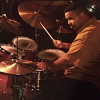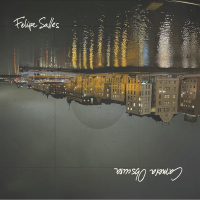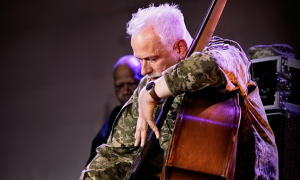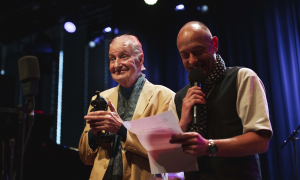Home » Jazz Articles » Profile » Mike Nock: Making Music Flow from the River Within
Mike Nock: Making Music Flow from the River Within

This is the place where pianist Mike Nock spent his childhood and the landscape that would be a significant part of not only his DNA, but also the body of his music which, with its ebb and flow, and sense of movement and space, seems to sing the wordless songs of his home country.
Chapter Index
Beginnings: From Christchurch to New York
Nock, who was born in Christchurch on September 27, 1940, had an insatiable appetite for music early in his life, and fortunately he had the guiding lights to help him. At the tender of age of 11, he was already knee-deep into music. His father helped him to practice the piano. and an anecdote told by Nock speaks of how he would skip the pages of the piano books to constantly be ahead, and yet his father emphasized the importance of learning each page thoroughly.
The combination of restless curiosity and aesthetic perfectionism would be something that would continue to follow Nock the rest of his musical career and be a hallmark of his approach to playing, teaching and composing. Besides his father, another early influence was the local pharmacist, Bert McNamara, who was also a keen pianist and had a sizeable record collection. McNamara became Nock's entry into jazz tradition and throughout the years, he continued to take in influences as diverse as

Oscar Peterson
piano1925 - 2007

Bill Evans
piano1929 - 1980

McCoy Tyner
piano1938 - 2020

Cecil Taylor
piano1929 - 2018
In 1952, Nock's father died and this tragic event became a turning point in his life. As Nock reveals to his biographer Norman Meehan in the book Serious Fun. The Life and Music of Mike Nock (Victoria University Press, 2011): "I was a staunch Catholic, but when my father died I felt that God had betrayed me by taking my father away from me. So I kind of rejected religion and music became my religion. That's why music is so powerful to me. The faith I had put into God was put into music."
Quite early in his life, music became a call and a way of living and not only something that was done in the spare time. It is significant that some of the major changes in Nock's life have been determined by music. Thus, Nock's move from Christchurch to New Zealand's capital city, Wellington, and, later, his journey to Australia and America were all a result of his desire to expand the possibilities of playing music and grow artistically.
 Nock's nature of exploration is also recognized by musicologist Wade Gregory who, in his thesis on Nock's contribution to Australian jazz, calls him: "A Global Villager, a roaming citizen of the jazz world and one of its most passionate ambassadors."
Nock's nature of exploration is also recognized by musicologist Wade Gregory who, in his thesis on Nock's contribution to Australian jazz, calls him: "A Global Villager, a roaming citizen of the jazz world and one of its most passionate ambassadors." Throughout the earliest phase of his career, Nock played in different constellations, one of them being the funnily titled The Fabulous Flamingos. However, the first constellation that had an air of international potential about it was The 3-Out Trio, with bassist Freddy Logan and drummer Chris Karan. Its infectious swing became something of a hit in Australia, but the trio never got an international breakthrough. Instead, Nock moved to America where he became a member of the jazz scene in New York and played with saxophonists

Yusef Lateef
woodwinds1920 - 2013

John Handy
saxophoneb.1933
The Fourth Way and the Sound of ECM
While playing with John Handy, Nock met violinist

Michael White
b.1954
Ron McClure
bassb.1941

Eddie Marshall
drumsb.1938
Recorded live at The New Orleans House (as is the rest of the album), the title track is an epic excursion into sound, with Nock exploring every nuance of the Fender Rhodes, changing between highly ornamented runs on the keys and spacious fills while McClure takes care of a deep, hypnotic groove and White's soaring violin plays a lovely theme and acts counterpoint to Nock's ideas. Without any cheap effects, the group easily conjures a musical momentum as Nock delivers a stellar solo halfway through the eight-minute track and later it all ends with Marshall banging away on the drums.
The Fourth Way had the potential to become a group as widely established as

Weather Report
band / ensemble / orchestra Nock's many musical influences are gathered most profoundly in the works in his own name. Whether working with a large ensemble, in a duo, trio, quartet or solo, he always takes a fresh approach to his material, constantly reinventing himself.
Nock's many musical influences are gathered most profoundly in the works in his own name. Whether working with a large ensemble, in a duo, trio, quartet or solo, he always takes a fresh approach to his material, constantly reinventing himself. An acknowledged classic of the 1980s is Ondas, the recording Nock made with bassist

Eddie Gomez
bassb.1944

Jon Christensen
drums1943 - 2020
Record Man: Working with Naxos
The 1990s saw Nock working as musical director of Naxos Jazz and creating his own sound as a producer. While he was with the label, he was responsible for releasing a host of exciting releases with the likes of organist

Sam Yahel
organ, Hammond B3
Florian Ross
composer / conductorb.1972

The real pearls of the Naxos Jazz catalog, however, are a string of releases that Nock did himself while he was associated with the label. Working with the label gave him artistic freedom and the opportunity to explore a wide range of musical formations, and he did so with decided success.
Not We But One (Naxos Jazz, 1997) is an empathic trio session with bassist

Anthony Cox
bass, acousticb.1954

Tony Reedus
drums1959 - 2008
An even more intimate Naxos session is Nock's meeting with reed multi-instrumentalist

Marty Ehrlich
woodwindsb.1955

Dave Liebman
saxophoneb.1946
Ozboppin' (Naxos Jazz, 1998) is Nock cutting his teeth with a group of fiery young Australian lions, who are eager to impress the master. At times, there are touches of avant- garde madness, as in the title track where Nock almost approaches Cecil Taylor, but overall it is fairly straight-ahead session with superb playing throughout. It's a record that shows how the hectic pulse of New York sometimes finds its way into his music.
The New Sound of a Trio
The new millennium has found Nock creating some of his strongest material. A particular highlight is Meeting of the Waters (Jazzhead, 2008) where Nock plays his compositions with a large ensemble, "a small big band" that combines lush textures and polyphonic complexity with the transparent and light sound cultivated aesthetically by

Gerry Mulligan
saxophone, baritone1927 - 1996
 It is fascinating to hear how through-composed pieces like "Cyboreal" and "Sho's Cradle Song"—which can also be heard in versions for solo piano on In the Time of Sakura: The Piano Music of Mike Nock (Move, 2007)—are given extra shades and hues in these ensemble versions, from the subtle scratches of percussion in "Sho's Craddle Song" to the dancing vibraphone and breezy brass charts in "Cyboreal."
It is fascinating to hear how through-composed pieces like "Cyboreal" and "Sho's Cradle Song"—which can also be heard in versions for solo piano on In the Time of Sakura: The Piano Music of Mike Nock (Move, 2007)—are given extra shades and hues in these ensemble versions, from the subtle scratches of percussion in "Sho's Craddle Song" to the dancing vibraphone and breezy brass charts in "Cyboreal." Besides working with larger ensembles, the 2000s have also seen Nock forming one of his most significant musical partnerships in a long time: his collaboration with the Waples brothers Ben (bass) and James (drums). Their work together is documented superbly on the two releases—An Accumulation of Subtleties (FWM Records, 2010) and Hear and Know (FWM Records, 2011)—where all the different aspects of Nock's work so far seem to come together.
Nock plays both inside and outside, composed and improvised, in a bold transcendence of genres where fiery neo-bop meets impressionistic modern jazz and neoclassical compositions, all held together by a tight group which knows how to sail into unknown waters.
Speaking of water, the blue liquid could easily be seen as metaphor for a special kind of musicality embodied in Nock. He grew up in Christchurch, where the river Avon flows through the center of the city, and has never lost the touch of nature.
Nock's music—in spite of its references to all that's modern and hectic—is, in its essence, pastoral. His music connects to feelings as ancient as nature itself, it's deep and emotional: a language of the heart. It's from that inner river of emotions that his music flows, reaching into foreign shores to create a vocabulary for that which cannot be said or seen.
Acknowledgement
Norman Meehan: Serious Fun. The Life and Music of Mike Nock (Victoria University Press, 2010)
Wade Gregory: In His Own Sweet Way: A Study of Mike Nock's Contribution to Australian Jazz (Dissertation, Queensland Conservatory of Music, Griffith University, October, 2007)
Selected Discography:
Mike Nock Trio Plus, Hear and Know (FWM Records, 2011)
Mike Nock Trio, An Accumulation of Subtleties (FWM Records, 2010)
Mike Nock Project, Meeting of the Waters (Jazzhead, 2008)
Michael Kieran Harvey, In the Time of Sakura: The Piano Music of Mike Nock (Move Records, 2007)
Mike Nock/Dave Liebman, Duologue (Birdland Records, 2007)
Mike Nock/Marty Ehrlich, The Waiting Game (Naxos Jazz, 2000)
Mike Nock Quintet, Ozboppin' (Naxos Jazz, 1998)
New York Jazz Collective, I Don't Know This World Without Don Cherry (Naxos Jazz, 1997)
Mike Nock Trio, Not We But One (Naxos Jazz, 1997)
Mike Nock, Touch (Birdland Records, 1994)
Mike Nock, Ondas (ECM, 1982)
Mike Nock, Climbing (Tomato, 1979)
The Fourth Way, The Sun and Moon Have Come Together (Harvest, 1969)
John Handy, Projections (Columbia, 1968)
Yusef Lateef, Live at Pep's (Impulse, 1964)
The 3-Out Trio, Move (Columbia, 1960)
Photo Credits
All Photos: Courtesy of

Mike Nock
pianob.1940
Tags
Mike Nock
Profiles
Jakob Baekgaard
Australia
oscar peterson
Bill Evans
McCoy Tyner
Cecil Taylor
Yusef Lateef
John Handy
Michael White
Ron McClure
Eddie Marshall
Weather Report
Eddie Gomez
Jon Christensen
Sam Yahel
Florian Ross
Anthony Cox
Tony Reedus
Marty Ehrlich
Dave Liebman
Gerry Mulligan
Comments
PREVIOUS / NEXT
Support All About Jazz
 All About Jazz has been a pillar of jazz since 1995, championing it as an art form and, more importantly, supporting the musicians who make it. Our enduring commitment has made "AAJ" one of the most culturally important websites of its kind, read by hundreds of thousands of fans, musicians and industry figures every month.
All About Jazz has been a pillar of jazz since 1995, championing it as an art form and, more importantly, supporting the musicians who make it. Our enduring commitment has made "AAJ" one of the most culturally important websites of its kind, read by hundreds of thousands of fans, musicians and industry figures every month.





 Buy Now
Buy Now























